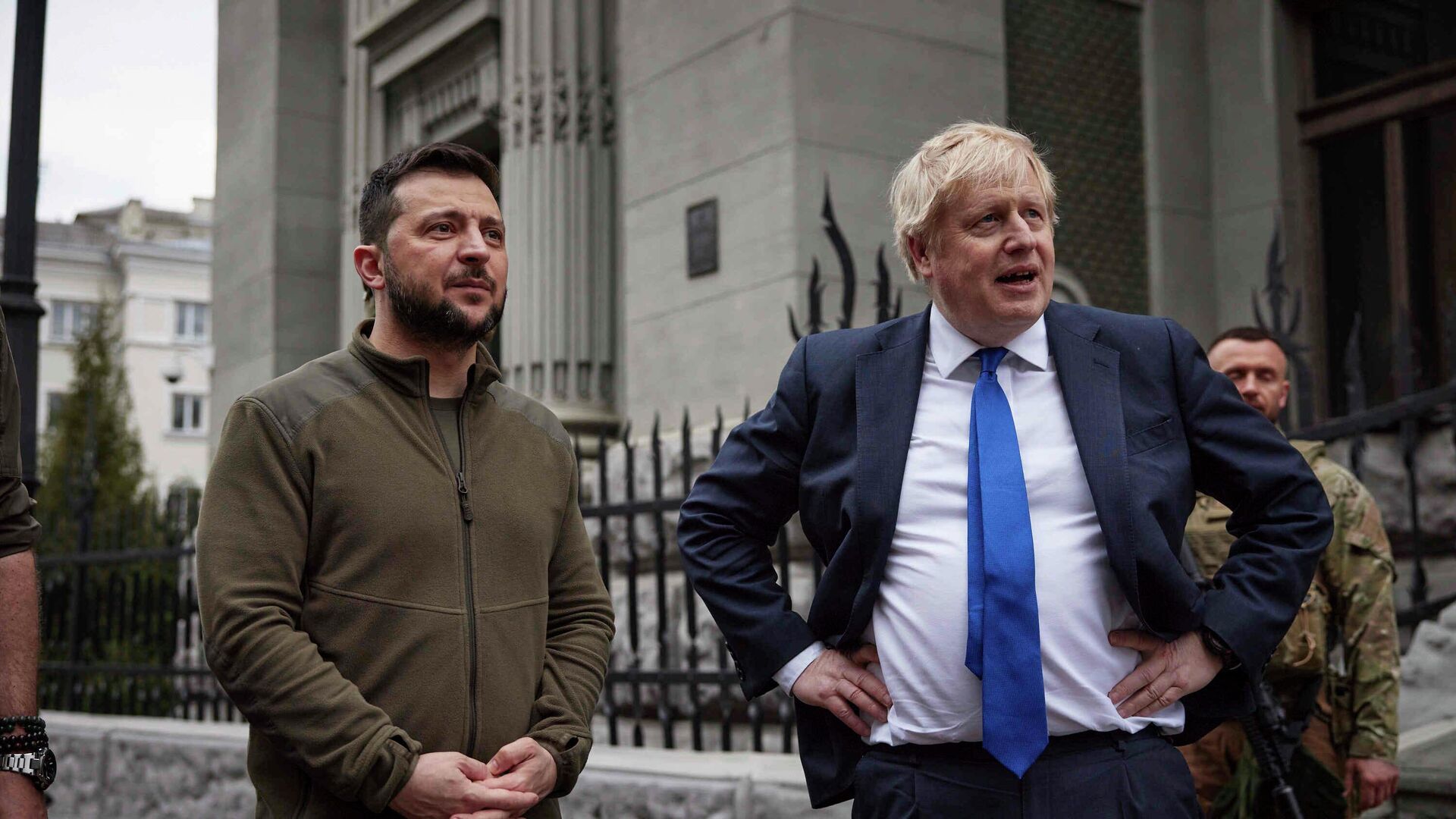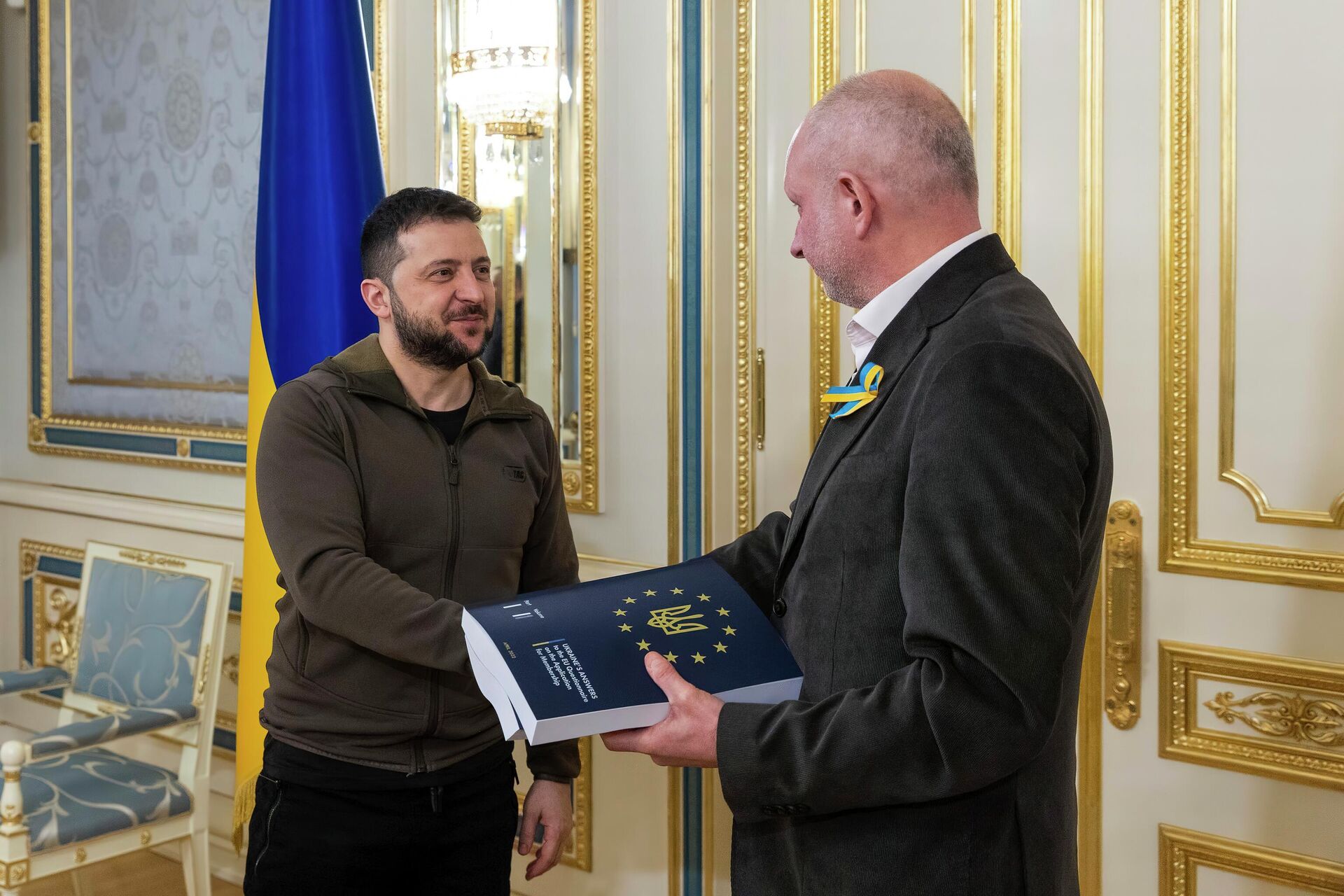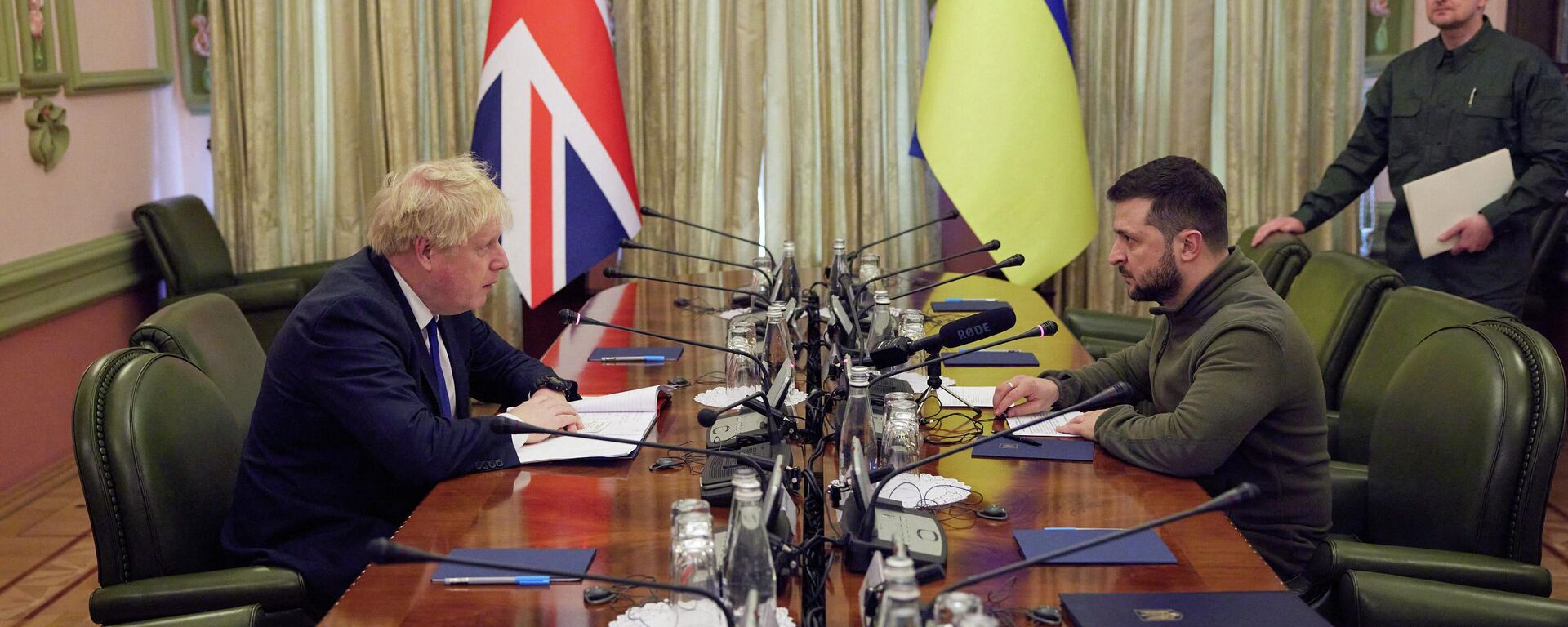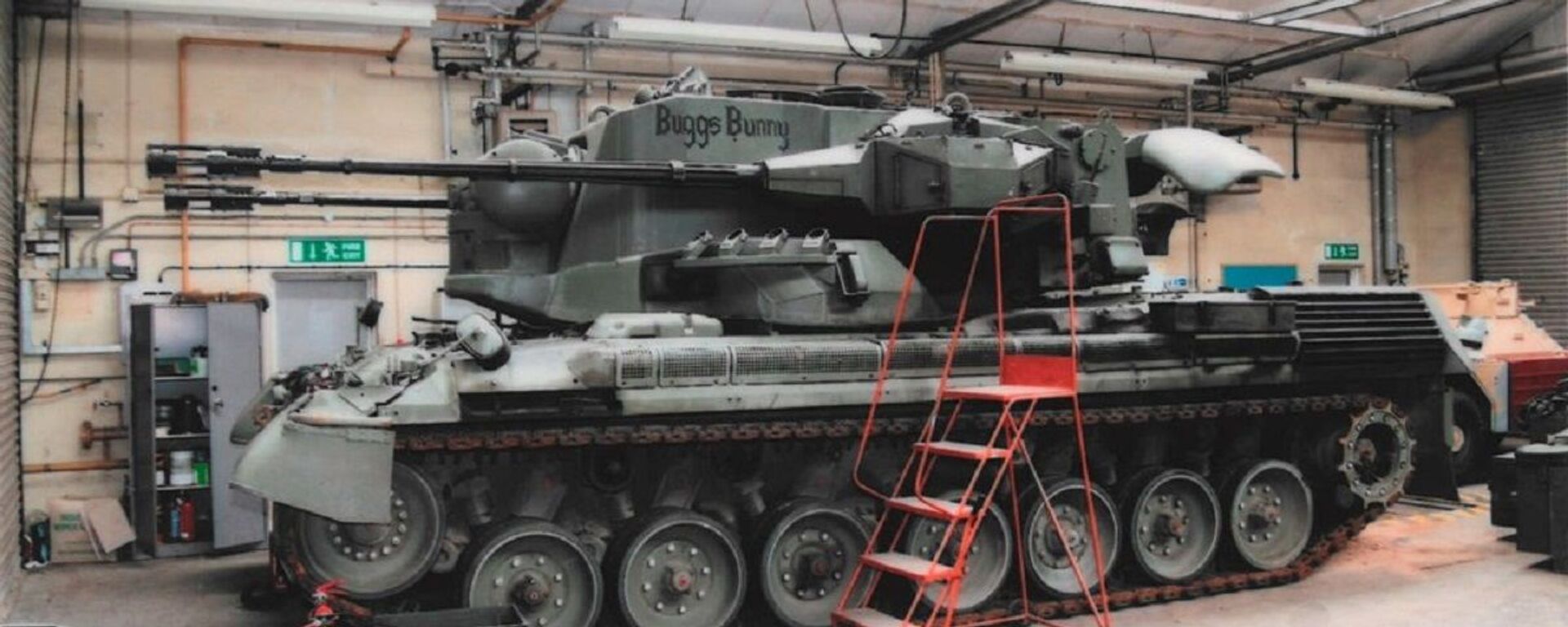https://sputnikglobe.com/20220527/bojo-pitched-zelensky-plans-for-a-new-alliance-with-ukraine-against-russia---italian-media-1095819424.html
BoJo Pitched Plans to Zelensky for a ‘New Alliance’ With Ukraine 'Against Russia' - Italian Media
BoJo Pitched Plans to Zelensky for a ‘New Alliance’ With Ukraine 'Against Russia' - Italian Media
Sputnik International
UK Prime Minister Boris Johnson travelled on a surprise visit to Kiev on 9 April, meeting with Ukrainian President Volodymyr Zelensky in “a show of solidarity”... 27.05.2022, Sputnik International
2022-05-27T10:09+0000
2022-05-27T10:09+0000
2023-05-28T15:19+0000
russia's special operation in ukraine
ukraine
boris johnson
volodymyr zelensky
european union (eu)
ursula von der leyen
united kingdom (uk)
https://cdn1.img.sputnikglobe.com/img/07e6/05/02/1095213124_0:0:3000:1688_1920x0_80_0_0_92d88ee2f3c33796e7c6b5fd9eb4aa84.jpg
UK Prime Minister Boris Johnson has pitched Ukrainian President Volodymyr Zelensky the idea of creating a new international alliance directed against Russia, Italian media reported.Johnson announced his initiative during a meeting with the Ukrainian president in Kiev on 9 April, according to cited sources familiar with the talks and attending the World Economic Forum (WEF) in Davos.The WEF Annual Meeting 2022 is taking place in Switzerland under the theme, "Working Together, Restoring Trust" from 22 to 26 May.Since the visit of the UK prime minister to Kiev, negotiations on the issue have continued, with British courtship towards Ukraine becoming more and more pressing, insiders added.The UK PM purportedly sees this new “political, economic and military alliance” as a counterbalance to the European Union, bringing together countries sharing a distrust of Brussels’ policies and critical of Germany's “hesitant politics” in response to Russia’s ongoing special military operation in Ukraine.The “coalition” would be led by the United Kingdom, and should also include Ukraine, Poland, Estonia, Latvia, Lithuania, and, eventually, Turkey.As the Italian outlet Corriere Della Sera clarifies, Ukraine has not yet announced its position regarding the novel initiative conceived by the British prime minister. According to the report, Zelensky is holding off with his response until the EU summit on 23 June.Ukraine has already completed a questionnaire, which will form a starting point for the EU to decide on membership for Kiev after European Commission President Ursula von der Leyen handed the paperwork to Zelensky during her visit on 8 April.Accordingly, the decision made by the EU may affect how Kiev responds to London's proposal, the newspaper said.The European Commission, the bloc's executive arm, will give its opinion on Ukraine's candidacy request in June, but even if approved, the process takes several years and can be vetoed by a member state.A bid by Ukraine to join the European Union could not be finalised for "15 or 20 years", France's Europe minister said Sunday.EU accession negotiations have been under way with Albania and North Macedonia since 2020, and Montenegro since 2012.Therefore, some sources suggest EU member-states may limit themselves to vaguely declaring that Kiev has a "European perspective" (the so-called "Thessaloniki formula"). European leaders promised the Western Balkan states during the EU summit in Thessaloniki in June 2003 that their future was within the united Europe, and that each of them could prospectively become an EU member.In that case, Zelensky may be prompted to consider Johnson's alternative offer more seriously, the publication adds. However, it notes that the British project may actually have “feet of clay”, as London does not have the capacity of the European Union to financially support Ukraine, nor is there certainty that Poland or the Baltic countries would agree to embark on an initiative that could compromise relations with Brussels.Boris Johnson, according to the report, is looking for political dividends that would provide him with more barter clout when dealing with Brussels on post-Brexit trade. The two sides have been teetering on the brink of a full-blown trade war over the contentious Northern Ireland Protocol. London may be hoping to capitalise on the fracture lines manifest on the European continent between countries vociferously funnelling aid to Ukraine - such as the UK and Poland - and those that do so with a greater degree of reservation, writes Corriere Della Sera.Since Russia started its special operation to demilitarise and de-Nazify its neighbour on 24 February, seeking to protect the people of the Donetsk and Lugansk People’s Republics from constant attacks by Kiev forces, Western nations have been falling over themselves to send arms and military gear to Ukraine.The US has committed billions of dollars in arms support to Ukraine and its allies in Europe have followed suit. Russia has frequently warned about the dangers of arms deliveries to Ukraine, stressing that the cargoes constitute a legitimate military target and that such assistance will merely prolong the conflict.
https://sputnikglobe.com/20220418/mocking-churchill-bojo-is-fanning-ukraine-conflict-to-save-his-own-political-skin-observers-say-1094866652.html
https://sputnikglobe.com/20220525/ukraines-ambassador-to-germany-disappointed-by-slow-pace-of-weapons-deliveries-1095776207.html
ukraine
united kingdom (uk)
Sputnik International
feedback@sputniknews.com
+74956456601
MIA „Rossiya Segodnya“
2022
News
en_EN
Sputnik International
feedback@sputniknews.com
+74956456601
MIA „Rossiya Segodnya“
Sputnik International
feedback@sputniknews.com
+74956456601
MIA „Rossiya Segodnya“
ukraine, boris johnson, volodymyr zelensky, european union (eu), ursula von der leyen, united kingdom (uk)
ukraine, boris johnson, volodymyr zelensky, european union (eu), ursula von der leyen, united kingdom (uk)
BoJo Pitched Plans to Zelensky for a ‘New Alliance’ With Ukraine 'Against Russia' - Italian Media
10:09 GMT 27.05.2022 (Updated: 15:19 GMT 28.05.2023) UK Prime Minister Boris Johnson travelled on a surprise visit to Kiev on 9 April, meeting with Ukrainian President Volodymyr Zelensky in “a show of solidarity” while offering new military and financial aid to Ukraine.
UK Prime Minister Boris Johnson has pitched Ukrainian President Volodymyr Zelensky the idea of creating a new international alliance directed against Russia, Italian media
reported.
Johnson announced his initiative during a meeting with the Ukrainian president in Kiev on 9 April, according to cited sources familiar with the talks and attending the World Economic Forum (WEF) in
Davos.
The WEF Annual Meeting 2022 is taking place in Switzerland under the theme, "Working Together, Restoring Trust" from 22 to 26 May.
Since
the visit of the UK prime minister to Kiev, negotiations on the issue have continued, with British courtship towards Ukraine becoming more and more pressing, insiders added.
The UK PM purportedly sees this new “political, economic and military alliance” as a counterbalance to the European Union, bringing together countries sharing a distrust of Brussels’ policies and critical of Germany's “hesitant politics”
in response to Russia’s ongoing special military operation in Ukraine.
The “coalition” would be led by the United Kingdom, and should also include Ukraine,
Poland, Estonia, Latvia, Lithuania, and, eventually, Turkey.
As the Italian outlet Corriere Della Sera clarifies, Ukraine has not yet announced its position regarding the novel initiative conceived by the British prime minister. According to the report,
Zelensky is holding off with his response until the EU summit on 23 June.
Ukraine has already completed a questionnaire, which will form a starting point for the EU to decide on membership for Kiev after European Commission President Ursula von der Leyen handed the paperwork to Zelensky during her visit on 8 April.
"This is where your path towards the European Union begins", said von der Leyen, adding she intended to, "present Ukraine's application to the [European] Council this summer".
Accordingly, the decision made by the EU may affect how Kiev responds to London's proposal, the newspaper said.
The European Commission, the bloc's executive arm, will give its opinion on Ukraine's candidacy request in June, but even if approved, the process takes several years and can be vetoed by a member state.
A bid by Ukraine
to join the European Union could not be finalised for "15 or 20 years", France's Europe minister said Sunday.
"We have to be honest. If you say Ukraine is going to join the EU in six months, or a year or two, you're lying… it takes a long time", Clement Beaune told Radio J.
EU accession negotiations have been under way with Albania and North Macedonia since 2020, and Montenegro since 2012.
Therefore, some sources suggest EU member-states may limit themselves to vaguely declaring that Kiev has a "European perspective" (the so-called "Thessaloniki formula"). European leaders promised the Western Balkan states during the EU summit in Thessaloniki in June 2003 that their future was within the united Europe, and that each of them could prospectively become an EU member.
In that case, Zelensky may be prompted to consider Johnson's alternative offer more seriously, the publication adds. However, it notes that the British project may actually have “feet of clay”, as London does not have the capacity of the European Union to financially support Ukraine, nor is there certainty that Poland or the Baltic countries would agree to embark on an initiative that could compromise relations with Brussels.
Boris Johnson, according to
the report, is looking for political dividends that would provide him with more barter clout when dealing with Brussels on post-Brexit trade. The two sides have been teetering on the brink of a
full-blown trade war over the contentious Northern Ireland Protocol. London may be hoping to capitalise on the fracture lines manifest on the European continent between countries vociferously funnelling aid to Ukraine - such as the UK and Poland - and those that do so with a greater degree of reservation, writes Corriere Della Sera.
Since Russia started its special operation to demilitarise and de-Nazify its neighbour on 24 February, seeking to protect the people of the Donetsk and Lugansk People’s Republics from constant attacks by Kiev forces, Western nations have been falling over themselves
to send arms and military gear to Ukraine.
The US has
committed billions of dollars in arms support to Ukraine and its allies in Europe have followed suit. Russia has frequently warned about the dangers of arms deliveries to Ukraine, stressing that the cargoes constitute a legitimate military target and that such assistance will merely prolong the conflict.





